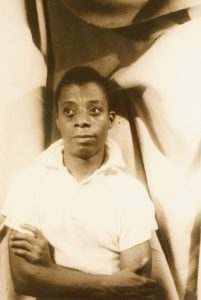Posted by Dorothy Lazard on Wednesday, September 27th, 2017
Writer James Baldwin's fiery prose and sharp critiques on American society resonate 30 years after his death
"Not everything that is faced can be changed, but nothing can be changed until it is faced.” --James Baldwin from "As Much Truth As One Can Bear" in The Cross of Redemption: Uncollected Writings
James Baldwin was living comfortably and productively in France as a successful expatriate writer when the American Civil Rights Movement kicked into high gear in the early 1960s. Spurred by the violent repression of peaceful demonstrations, racial violence, and widespread job and housing discrimination in America, he returned home to witness for himself what was tearing America apart. He traveled throughout the country to engage student activists, religious and community leaders, and politicians to hear what they thought about the turbulent state of affairs. Most notably, Baldwin used his fame as a celebrated writer to speak out about racism and its corrosive effect on both its victims and perpetrators. It was during these years that he wrote one of his most famous works, "The Fire Next Time."
In May 1963 Baldwin visited the San Francisco Bay Area, touring San Francisco's impoverished Hunter's Point and Potrero Hill neighborhoods to talk with unemployed youth and community organizers. On this tour he stopped at Oakland’s Castlemont High School where he delivered an inspiring speech to the students. You can hear Baldwin’s Castlemont speech on the Internet Archive.
Baldwin’s astute critique of American bigotry and hypocrisy, his articulate but fiery prose put him in the pantheon of great American critical thinkers. With incidents like the LA riots of 1992, rampant police killings of innocent and unarmed citizens, mass displacement of minority communities due to gentrification we find ourselves, fifty years later, still challenged by the same issues that Baldwin spent so much of his career exposing and trying to eradicate. Thirty years after his death, Baldwin is still relevant as evidenced by the 2016 Oscar-nominated documentary film, "I Am Not Your Negro" by Raoul Peck.
James Baldwin died in St.-Paul de Vence, France, in December 1987 at age 63.
Books by and about James Baldwin are available at an Oakland Public Library near you:



Add a comment to: James Baldwin and “The Price of the Ticket”